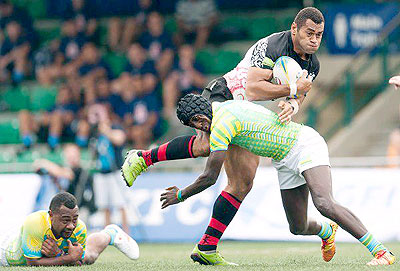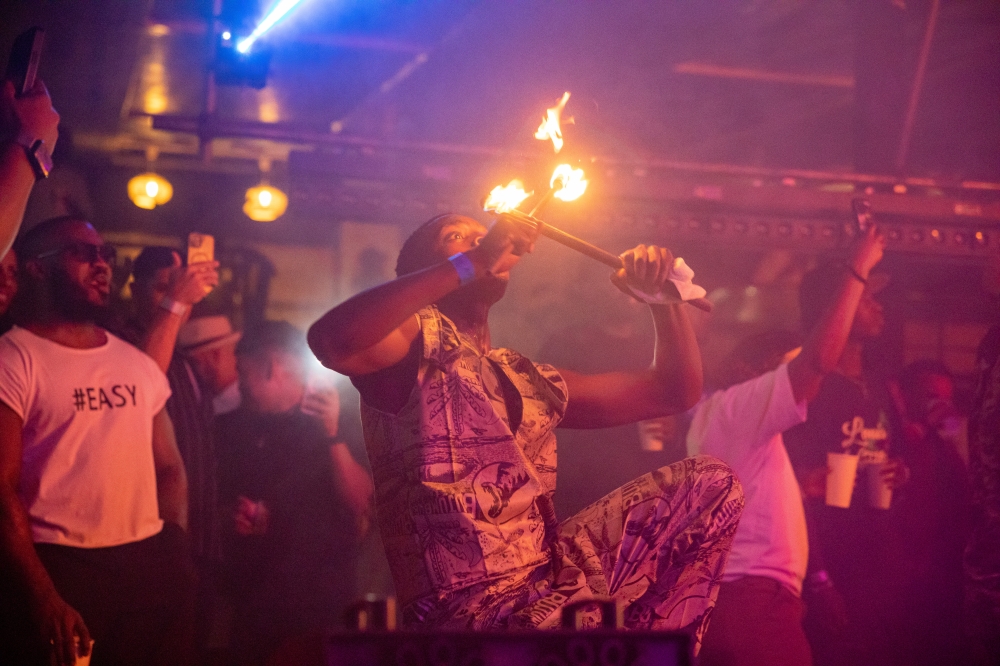RWANDA national rugby team (Silverbacks) 7s captain Lucien Bikamba is probably the most experienced rugby player in the country. HR has been playing the game since it was first introduced 13 years ago.


RWANDA national rugby team (Silverbacks) 7s captain Lucien Bikamba is probably the most experienced rugby player in the country. HR has been playing the game since it was first introduced 13 years ago.Born to Louis Bikamba and Turiya Basedeke on May 11, 1985 in Bukavu, DR Congo, Bikamba is a twin, and the pair is second in the family of six children.As a youngster, Bikamba had always dreamt of becoming an international rugby player. He admires Jonathan Peter Wilkinson, a member of the England national team.The 28-year-old Bikamba attended College Alifajiri (a primary school based in Bukavu, DR Congo) and attended his secondary school at Gikondo-based College APAPE from where he majored in accounting.Early days"Before finding my passion in rugby, like most kids I used to play football since my childhood until when rugby was introduced in the country in 2000 by a former Frenchman teacher at Nyarugenge-based école Française, Mr. Pierre Hofer,” Bikamba recalls.By then, Bikamba’s cousin brother, was Hofer’s student at école Française, and is the one who introduced him to the then new sport in the country. Ever since, he decided to quit football and basketball to concentrate on rugby.Fly-half (playmaker in soccer terms) Bikamba says after joining rugby in 2000, he pushed himself harder to play it at the highest level and it has worked out for him as he’s currently one of the few renowned rugby players in Rwanda although he admits there is still a long journey before he realises his dream.Rugby growth in RwandaSince the sport was introduced in Rwanda back in 2000, Rugby has made quite a remarkable forward step. Soon after its introduction, the sport started to gain new audiences and fans in different parts of Kigali and the founders formed two pioneer clubs namely; Silverbacks and Rhinos but later the Silverbacks’ name was taken over by the national team.A few years after, it was noticed that rugby as a new sport in the country was growing and spreading in other parts of the country mostly in the Southern Province, thanks to students at the National University of Rwanda, other clubs were formed hence the creation of the national league.Currently the local rugby league has eight clubs namely: Remera Buffalos, Nyamirambo-based Lion des Fers, Sharks of Gikondo, Huye-based NUR Grizzlies, Tumba College, Kamonyi-based Puma and Simba of Kanombe in Kicukiro district.According to Rwanda Rugby Federation officials, the dream is to become a full member of the International Rugby Body (IRB) and the Silverbacks to grow to a higher level and competing with Africa’s powerhouses South Africa, Namibia, Kenya and Uganda among others. AchievementsBikamba, who is the vice captain of Buffalos rugby football club, played a crucial role for his side to win the league title for five consecutive seasons since 2009.In the national team, Bikamba has always been the number one option fly-half and he has helped the team win the Super 16 qualifying tournament that is contested by Rwanda, Burundi, Tanzania and DR Congo four times in a row since 2010. He also played a big role for the Silverbacks in the annual Hong-Kong 10s tournament in 2009, 2010 and 2011.The five-time league winner, Bikamba, captained the Silverbacks 15s team in 2008 and 2010, captained the 10s and 7s team in 2012 and he currently captains the 7s national team. The Silverbacks 7s team is the most active national team compared to 10s and 15s.Rugby not supported Bikamba says the national teams are barely supported either by rugby federation or by the Ministry of Sports and Culture but still hopes the next generation will play under better conditions."The team never gets residential training camps like other national teams before international tournaments, players cater for everything by themselves for the love of the game, otherwise they would all give up and do something else,” he told Saturday Sport in an interview recently.He adds, "Many players have quit the game over injuries picked while playing for their clubs or the national team but lack appropriate medical care, but we are still pushing hard to get everything in line.”His biggest vote of thanks goes to Englishman Dave Hughe, who has single-handedly been sponsoring the national teams since 2009. Hughe provides air tickets, accommodations, meals and kits for the Silverbacks when traveling to compete in the annual Hong-Kong 10s tournament.The Silverbacks 7s team is set to compete in this year’s international Kenya Safaricom Open tournament scheduled for September 22-24 in Nairobi.




